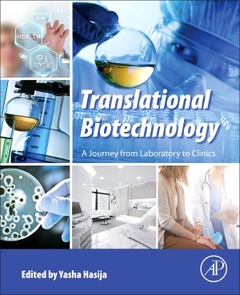Description
Translational Biotechnology
A Journey from Laboratory to Clinics
Coordinator: Hasija Yasha
Language: English
Subject for Translational Biotechnology:
Keywords
?Acute myeloid leukemia; Adoptive cell transfer therapy; Advanced research infrastructure; Advanced technology platform; Amphiphile; Amyloid; Antibiotic resistance; Antibodies; Antibody engineering; Antibody phage display; Applications; Artemisinin; Artificial intelligence; Bi-specific antibodies; Bio-therapeutics; Bio-therapeutics in COVID-19; Biological therapeutics; Biologics; Biomarker; Biomedical; Biopharmaceuticals; Biosimilars; Biotechnology; Bispecific antibodies; CAR-T-cell therapy; Cancer immunotherapy; Cell-based immunotherapy; Challenges; Chloroquine; Coiled-coil; Computer-aided drug discovery; Core facility; DNA vaccines; Dark genome DNA; Data-driven clinical research; Drug discovery; Drug discovery platform; Drug repositioning; Dual targeting; Economic development; Electronic health records; Enzyme replacement therapy; Euclidean distance; Evidence-based medicine; Fecal microbiota transplant therapy; Fibril; Fmoc; Genomics; Health economy; Hepatocellular carcinoma; Human disease model system; Hybridoma technology; Hydrogel; IPSCs; Implementation; Integrative biology; Interactome; Intergenic sequences; Knowledge translation; LncRNA; MRNA vaccines; Malaria drugs; Medical service system; MiRNA; Microbiome-based therapy; Monoclonal antibodies; Multifunctional antibodies; Nano-based drugs; Natural compounds; Networks; Neurodegenerative disorders; Neurodevelopmental disorders; New TOPSIS approach; Noncoding RNA; Noncoding sequences; Nonexpressive sequences; Nucleic acid therapeutics; Opportunities; Organoids; Peptide; Phage therapy; Pharma; Pharmacodynamic biomarker; Pharmacogenomics; Pharmacokinetic–pharmacodynamic drug responses; Pharmacokinetic–pharmacodynamic modeling; Prebiotics; Precision medicine; Probiotics; Proteomics; RDNA; RTS; S; Research hub; Scientific platform; Shared research facilities; Shared research infrastructure; SiRNA; Small molecules; Stem cells; Synthetic biology
452 p. · 19x23.3 cm · Paperback
Description
/li>Contents
/li>Biography
/li>Comment
/li>
Section 1. Introduction to Translational BiotechnologySection 2. BiotherapeuticsSection 3. Pathway and Target DiscoverySection 4. Novel Therapeutic ModalitiesSection 5. Bioinformatics to BedsideSection 6. Systems Approach and Engineering BiologySection 7. Drug Discovery, Personalized and Precision MedicineSection 8. Socio-Economic Impact of Translational Biotechnology
Technological University. She has published more than 100 research articles and review papers in national and international
journals and conferences and 19 book chapters. She has served as Topic Editor in Frontiers in Physiology, Computational Physiology, and Medicine, 2022, and is also on the Editorial Board of numerous international journals. She has made noteworthy
contributions in the area of Biotechnology and Bioinformatics as an author and editor of two notable books.
Dr. Hasija’s work has earned recognition and received several prestigious awards, including the Govt. of India–Department
of Science and Technology Award for attending the meeting of Nobel Laureates and Students in Lindau, Germany, in 2002;
and Human Gene Nomenclature Award at the Human Genome Meeting 2010 held at Montpellier, France. She has also been
awarded Research Excellence Awards at DTU for 5 consecutive years (2018–2022). Prof. Hasija is the Project Investigator of
several sponsored research projects from Govt. of India departments including DST, CSIR, and DBT. She has delivered more
than 20 invited talks at several prestigious universities and institutions. She is an Active Researcher supervising BTech, MTech,
MSc, and PhD students at Delhi Technological University. Her broad areas of research include genome informatics, integration
of genome-scale data for systems biology, and machine learning applications in healthcare.
- Explains biotechnology in a different light by using an application-oriented approach
- Discusses practical approaches in the development of precision medicine tools, systems and dynamical medicine approaches
- Promotes research in the field of biotechnology that is translational in nature, cost-effective and readily available to the community
These books may interest you

Biotechnology Fundamentals 214.69 €



